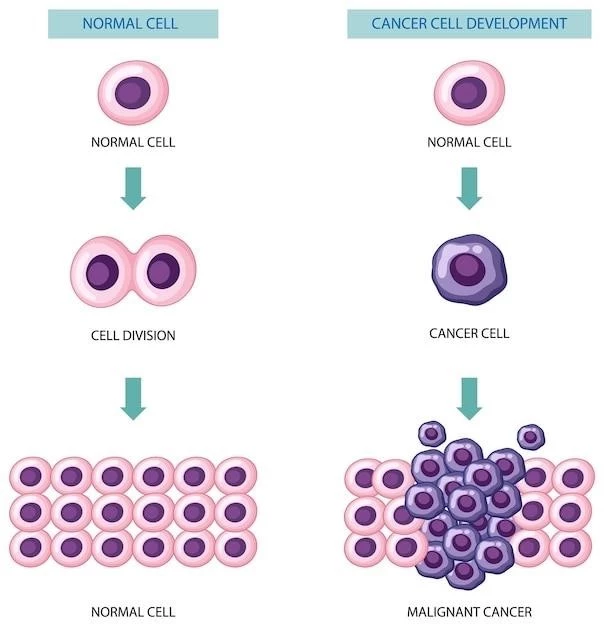B-cell lymphomas originate in the B cells of the immune system․ Understanding their different types, symptoms, causes, treatment options, prognosis, and risk factors is crucial․ Stay informed about the latest research advances in B-cell lymphomas to ensure effective management․
Types of B-cell Lymphomas
B-cell lymphomas are a diverse group of cancers that affect B cells, a type of white blood cell․ There are various types of B-cell lymphomas, classified based on their characteristics and behavior․ Some common types include⁚
- Diffuse Large B-cell Lymphoma (DLBCL)⁚ This is the most common type of non-Hodgkin lymphoma, characterized by fast-growing tumors․
- Follicular Lymphoma⁚ This type usually grows slowly and is characterized by lymph node enlargement․
- Marginal Zone Lymphoma⁚ Marginal zone lymphomas are generally slow-growing and arise from B cells in the marginal zone of lymphoid tissue․
- Chronic Lymphocytic Leukemia/Small Lymphocytic Lymphoma (CLL/SLL): These two closely related diseases are characterized by an overproduction of abnormal lymphocytes․
- Mantle Cell Lymphoma⁚ Mantle cell lymphoma is a relatively rare type that typically grows and spreads quickly․
- Burkitt Lymphoma⁚ This aggressive B-cell lymphoma is fast-growing and requires immediate treatment․
These are just a few examples of the diverse types of B-cell lymphomas․ Each type presents with unique characteristics and requires individualized treatment approaches․ Understanding the specific type of B-cell lymphoma a patient has is crucial in determining the most effective treatment plan․
Symptoms of B-cell Lymphomas
Symptoms of B-cell lymphomas can vary depending on the type of lymphoma and where it originates․ General symptoms may include⁚
- Swollen lymph nodes⁚ One of the most common symptoms is the enlargement of lymph nodes, usually painless․
- Fever⁚ Persistent or recurrent fever without any known cause could be a symptom of B-cell lymphoma․
- Unexplained weight loss⁚ Losing weight without trying may be a sign of malignancy․
- Night sweats⁚ Profuse sweating at night that may drench clothes and beddings․
- Fatigue⁚ Feeling fatigue or weakness that does not improve with rest․
- Itching⁚ Pruritus without any apparent cause can sometimes be associated with lymphoma․
- Shortness of breath⁚ Difficulty breathing may occur if lymphoma affects the chest area․
- Abdominal pain or swelling⁚ Lymphomas in the abdomen can lead to pain, cramping, or swelling․
- Neurological symptoms⁚ Rarely, B-cell lymphomas can cause symptoms like headaches, seizures, or changes in mental status․
If you experience persistent symptoms or a combination of these, it is essential to consult a healthcare provider for an accurate diagnosis and appropriate management․ Early detection of B-cell lymphomas can lead to better treatment outcomes and prognosis․
Treatment Options for B-cell Lymphomas
The treatment of B-cell lymphomas aims to eliminate cancer cells, manage symptoms, and prevent the disease’s recurrence․ The choice of treatment depends on factors such as the type and stage of lymphoma, the patient’s overall health, and personal preferences․ Common treatment options include⁚
- Chemotherapy⁚ This treatment involves the use of powerful drugs to kill cancer cells․ It can be given orally or intravenously․
- Immunotherapy⁚ Immunotherapy boosts the body’s immune system to fight cancer․ Monoclonal antibodies or checkpoint inhibitors are examples of immunotherapy․
- Targeted therapy⁚ Targeted drugs attack specific abnormalities in cancer cells without harming normal cells․
- Radiation therapy⁚ High-energy beams are used to destroy cancer cells․ It can be used alone or in combination with other treatments․
- Stem cell transplant⁚ This procedure involves replacing diseased bone marrow with healthy stem cells to restore normal blood cell production․
- Surgery⁚ In some cases, surgical removal of a tumor or affected lymph nodes may be necessary․
- Watchful waiting⁚ In certain situations, especially for slow-growing lymphomas, a healthcare provider may recommend closely monitoring the patient without immediate treatment․
Patients may receive a combination of these treatments in a personalized treatment plan designed by a multidisciplinary team of healthcare professionals․ It is essential for patients to discuss the potential benefits and side effects of each treatment option with their healthcare provider to make informed decisions about their care․
Causes of B-cell Lymphomas
The exact causes of B-cell lymphomas are not fully understood․ However, several factors have been linked to the development of these cancers․ Some of the potential causes and risk factors include⁚
- Genetic mutations⁚ Changes in the genetic material of B cells can lead to uncontrolled growth and division, contributing to the development of lymphomas․
- Immune system disorders⁚ Conditions that weaken the immune system increase the risk of B-cell lymphomas, as the immune system plays a crucial role in detecting and destroying abnormal cells․
- Chronic infections⁚ Infections with certain viruses, such as Epstein-Barr virus (EBV) or Helicobacter pylori, have been associated with an increased risk of B-cell lymphomas․
- Environmental factors⁚ Exposure to certain chemicals, pesticides, or radiation may elevate the risk of developing lymphomas․
- Age⁚ B-cell lymphomas are more common in older adults, with the risk increasing with age․
- Gender⁚ Some types of B-cell lymphomas are more prevalent in either males or females․
- Family history⁚ A family history of lymphomas or other cancers may predispose individuals to an increased risk of developing B-cell lymphomas․
It is important to note that while these factors may increase the likelihood of developing B-cell lymphomas, not all individuals with these risk factors will develop the disease․ More research is needed to better understand the complex interplay of genetic, environmental, and other factors in the development of B-cell lymphomas․
Prognosis for B-cell Lymphomas
The prognosis for B-cell lymphomas varies depending on various factors, including the type and stage of the lymphoma, the patient’s age and overall health, and the response to treatment․ Some key points related to the prognosis of B-cell lymphomas include⁚
- Lymphoma subtype⁚ Different B-cell lymphoma subtypes have varying prognoses․ For example, some types like Burkitt lymphoma may have a more aggressive course compared to follicular lymphoma․
- Stage of the lymphoma⁚ Early-stage B-cell lymphomas generally have a more favorable prognosis than advanced-stage lymphomas that have spread to multiple sites in the body․
- Response to treatment⁚ Patients who respond well to treatment and achieve remission have a better prognosis than those who have treatment-resistant disease․
- Genetic factors⁚ Genetic mutations within the cancer cells can impact the response to treatment and overall prognosis․
- Patient characteristics⁚ Factors such as age, overall health, and ability to tolerate treatments play a role in determining the prognosis of B-cell lymphomas․
- Relapse⁚ The risk of relapse after initial treatment can influence long-term prognosis․ Close monitoring is crucial to detect and address relapses promptly․
- Research and advances⁚ Ongoing research into new therapies and treatment approaches is continuously improving the prognosis for patients with B-cell lymphomas․
It is important for patients with B-cell lymphomas to work closely with their healthcare team to understand their specific prognosis, discuss treatment options, and develop a personalized care plan that optimizes their chances for a positive outcome․
Risk Factors for B-cell Lymphomas
Several risk factors increase the likelihood of developing B-cell lymphomas․ While having these risk factors doesn’t necessarily mean someone will develop lymphoma, being aware of them can help individuals take proactive steps towards early detection and management․ Key risk factors for B-cell lymphomas include⁚
- Age⁚ The risk of B-cell lymphomas increases with age, with most cases diagnosed in individuals over 60 years old․
- Gender⁚ Certain types of B-cell lymphomas are more common in males, while others may occur more frequently in females․
- Family history⁚ Individuals with a family history of lymphomas or other blood cancers may have a higher risk of developing B-cell lymphomas․
- Immune system conditions⁚ Conditions that weaken the immune system, such as HIV/AIDS, autoimmune diseases, or previous organ transplants, can increase the risk of lymphomas․
- Exposure to infections⁚ Infections with certain viruses, such as Epstein-Barr virus (EBV) or Helicobacter pylori, have been linked to an increased risk of B-cell lymphomas․
- Chemical exposure⁚ Contact with certain chemicals, pesticides, or other environmental toxins may raise the risk of developing B-cell lymphomas․
- Radiation exposure⁚ Previous radiation therapy or exposure to high levels of radiation, such as in nuclear accidents, is a known risk factor for lymphomas․
- Genetic factors⁚ Inherited genetic mutations or family syndromes may predispose individuals to B-cell lymphomas․
By understanding these risk factors, individuals and healthcare providers can work together to monitor for signs of B-cell lymphomas, implement preventive measures where possible, and facilitate early intervention if needed․
Research Advances in B-cell Lymphomas
Ongoing research in the field of B-cell lymphomas is continually advancing our understanding of the disease and improving treatment outcomes․ Some of the notable research advances in B-cell lymphomas include⁚

- Immunotherapy⁚ The development of novel immunotherapy approaches, such as chimeric antigen receptor (CAR) T-cell therapy, has shown promising results in treating certain types of B-cell lymphomas․
- Targeted therapies⁚ Researchers are focusing on developing targeted therapies that specifically attack cancer cells while minimizing damage to healthy cells, improving treatment efficacy and reducing side effects․
- Genetic profiling⁚ Advances in genetic sequencing technologies have enabled researchers to identify specific genetic mutations associated with B-cell lymphomas, leading to personalized treatment strategies․
- Biomarker discovery⁚ Biomarkers are being studied to help predict prognosis, response to treatment, and disease progression in B-cell lymphomas, aiding in more accurate diagnosis and management․
- Stem cell transplant innovations⁚ Ongoing research is exploring novel techniques and advancements in stem cell transplantation for B-cell lymphomas, seeking to improve treatment success rates and reduce complications․
- Combination therapies⁚ Researchers are investigating the effectiveness of combining different treatment modalities, such as chemotherapy, immunotherapy, and radiation therapy, to enhance treatment responses and outcomes․
- Drug development⁚ The development of new drugs and treatment regimens targeting specific pathways involved in the growth and spread of B-cell lymphomas is a significant area of research focus․
- Clinical trials⁚ Participation in clinical trials allows patients access to innovative treatments and contributes valuable data to ongoing research efforts aimed at improving the management of B-cell lymphomas․
These research advances hold promise for future improvements in the diagnosis, treatment, and prognosis of B-cell lymphomas, offering hope to patients and healthcare providers in the fight against this complex group of cancers․
